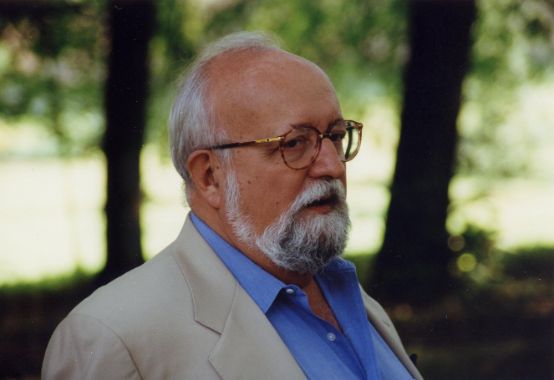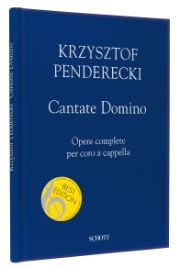Penderecki a cappella
This collection of choral works by the Polish composer spans over fifty years.

Penderecki's creative personality is an extraordinary phenomenon in our time, fascinating and confusing at the same time. Dynamic, enthusiastic about discovering new fields and transforming what he discovers, the composer leaves his mark on everything he encounters.
His works for choir a cappella were written over a period of more than half a century: from the psalm setting Exaltabo te, Domine (1958) and the sequence Stabat mater (1962) about the De profundis (1996) and the prayer Prosimy cię from the Book of Daniel (2009) to the Missa breviswhich was premiered in January 2013. They form a homogeneous group of works, although they were composed in several periods and use different languages. The composer draws on the centuries-old practice of the church to lead the faithful to devotion with the whole variety of music, be it chorale-like hymns, church songs or antiphonal chants between psalm verses. The composer also wrote a number of free pieces dedicated to friends or linked to special events. This is particularly true of the Missa breviswhich was created for the 800th anniversary of the St. Thomas Boys Choir.
The characteristic features of Penderecki's music include continuity, the slow, narrative style, the density and beauty of the harmony and an elaborate counterpoint. Most of the texts used are taken from the Bible and the liturgy in Latin.
Exaltabo te, Domine from Psalm 30 is set for four-part mixed choir. The Stabat mater calls for three four-part mixed choirs, as does the motet In pulverem mortis. The Miserere is a three-voice motet with static harmony throughout. The three choirs also include a two-part children's or women's choir. The Alliluia is set for two six to eight-part mixed choirs. Sicut locutus est begins with two four-part choirs and builds up to seven parts. The Agnus Dei requires eight mixed voices. The hymn Veni Creator is scored for four tenor parts along with soprano, alto and bass voices. The psalm De Profundis requires three mixed choirs, with tenors and basses in four parts in places. The Missa brevis consists of the usual chants of the Ordinary: Kyrie, Gloria, Sanctus, Benedictus and Agnus Dei. In the Kyrie, the tenors are doubled, as are the alto parts. In the Gloria, all registers are doubled and solo voices are also provided. Sanctus and Benedictus are written for four-part female choir.
The volume contains a total of 19 works for mixed choir a cappella, some also for male choir and some in Russian. The edition was awarded the Best Edition Prize by German music publishers.
Krzysztof Penderecki, Cantate Domino, Opere complete per coro a cappella 1958-2013, choral score, ED 21626, € 52.00, Schott, Mainz 2014









